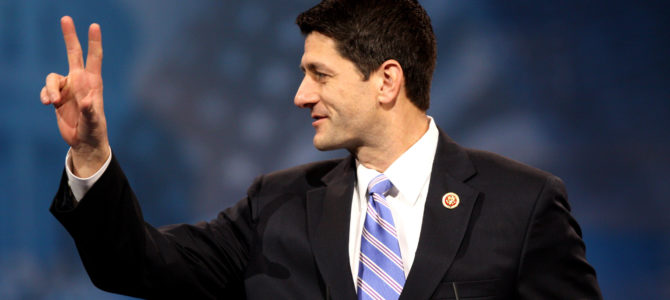
Speaker Paul Ryan’s spokesman, Brendan Buck, relayed this paragraph this morning:
“This morning Speaker Ryan shared with his colleagues that this will be his last year as a member of the House. He will serve out his full term, run through the tape, and then retire in January. After nearly twenty years in the House, the speaker is proud of all that has been accomplished and is ready to devote more of his time to being a husband and a father. While he did not seek the position, he told his colleagues that serving as speaker has been the professional honor of his life, and he thanked them for the trust they placed in him. He will discuss his decision at a press conference immediately following the member meeting.”
This retirement was the most open secret in Washington for months. No one believed Ryan would return even if Republicans had been more likely to hold the House of Representatives. As a practical matter, Kevin McCarthy and Steve Scalise have been jockeying internally over replacing Ryan as the House leader of the GOP – McCarthy’s relationship with Trump gives him the early favorite for that role – but every political prognosticator believes that role will be as Minority Leader, not Speaker.
In the aftermath of the Democratic waves in 2008, Ryan, McCarthy, and Eric Cantor presented themselves to Republican voters as The Young Guns – a new generation of conservatives largely untainted by the poor decisions of the Bush Administration, ready to lead in a time when Republicans were downtrodden and Democrats ebullient about the possibilities of the Obama years. Of the three, only Ryan had something particularly interesting to say: he was a blue-eyed salesman for the cod liver oil of entitlement reform. And he achieved something truly amazing: he got Republicans, at least for a time, to grasp that third rail. They voted for his reform plans reluctantly at first, but once they discovered the “throw granny off a cliff” ads had little power, their cowardice gradually dissipated.
Ryan was the most important Republican in Washington from 2009 to 2016. He now seems like a throwback from a bygone era, when voters expected their politicians to be straight-laced, honest, and sincere. He was serious, and dedicated himself to trying to tell stories to the American people about the fiscal direction of the country – stories which voters mostly ignored because they always seemed to involve hard news and histograms. Wisconsin nice and a truly decent person, Ryan’s approach was doomed in an era that values none of those things. It values the ferocity, the abandon of confrontational politics, not grand bargains and compromise.
After Eric Cantor crashed into a pile of earmarks, there were a number of political movers and shakers who fixed themselves to Ryanism as a method of grasping at power, not an expression of ideological dedication. They were never really in it because of a belief in Ryan’s refined Citizens for a Sound Economy message (whatever will Henry Olsen write about now?), but because they saw Ryan as a handsome, smart young family man who donors love and see as made for leadership. But leading this herd of cats is a tiring and thankless task Ryan took on out of obligation, not ambition. Leaving now makes sense for his own future – to leave with the W of tax reform and not the L November will bring. (And then, of course, he could come back to replace Arthur Brooks as the next president of AEI.)
Polls today clearly show the GOP is now President Trump’s party. It was truly his party from the moment he won the nomination, but now it is even moreso. His approval ratings are higher now than they were on Election Day. His ideology has not thoroughly supplanted Ryan’s – there are still free traders and free enterprise folks in the mix, supply sider Larry Kudlow is running the White House’s economic policy, and Republicans still give lip service to entitlement reform (mostly for the poor, not the old – they know where their bread is buttered). But Ryan’s departure is a departure for Ryanism as well – a clear-eyed look at the nation’s finances which deems them utterly out of control and in need of a sharp correction, a correction that has not and will not come.
It’s easy to forget how Paul Ryan was vilified by the media. For a politician with so few marks against him – the worst thing one could say was that he suggested staffers read Ayn Rand – Ryan was treated incredibly unfairly in 2012 as a vice presidential candidate, with no moment greater than when his policies were described inaccurately by Martha Raddatz in a terribly run debate where no question was even asked about his signature Medicare reform policies.
Ryan’s response to this trend was to grow frustrated, and irritated, but also to carefully and politely explain his policy perspective in more detail, to try and convince his interviewers, to build momentum for the type of Republican Party he thought the nation needed. Donald Trump’s response to this was to punch the media in the face, repeatedly. The voters let us know which response they prefer.









